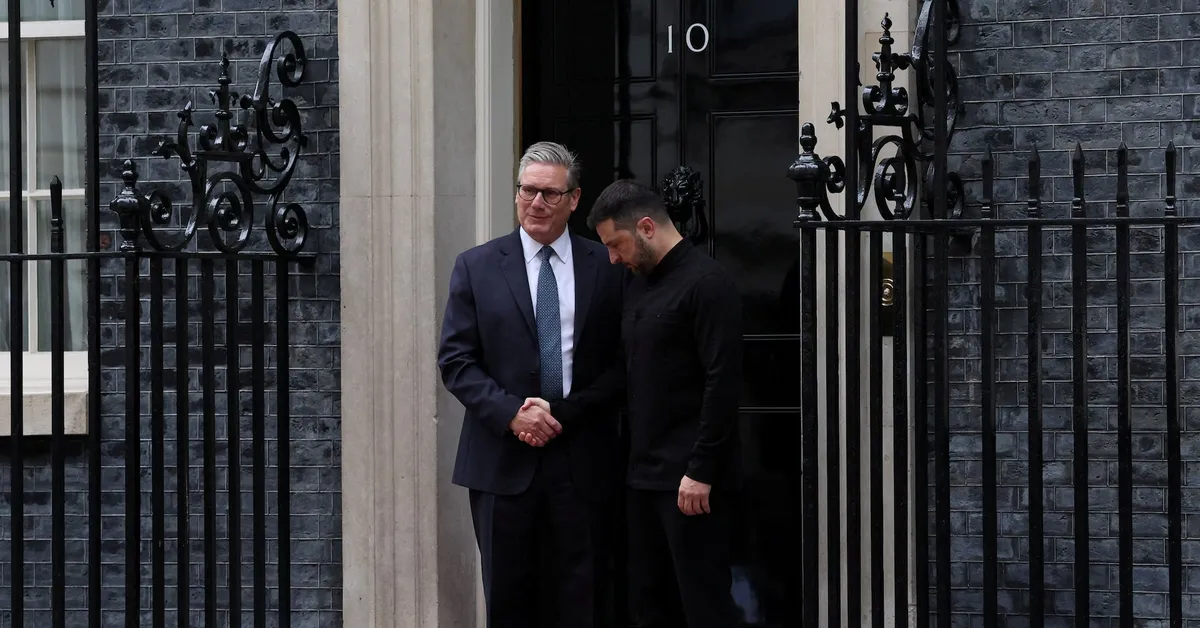
LONDON/KYIV, Aug 17 (Reuters) - In a significant diplomatic move, European leaders from Germany, France, and Britain are set to join Ukrainian President Volodymyr Zelenskiy for a crucial meeting with Donald Trump in Washington. This meeting, scheduled for Monday, aims to strengthen Zelenskiy's position as the U.S. President presses Ukraine to consider a swift peace agreement.
Trump's recent discussions with Kremlin chief Vladimir Putin in Alaska have prompted calls for a resolution, with Trump hinting at promising advancements concerning Russia in a social media announcement, although he did not specify the details. U.S. Secretary of State Marco Rubio indicated that Trump believes enough progress has been made to warrant a meeting with Zelenskiy and the European leaders, but emphasized that both Russia and Ukraine must be willing to make concessions for a successful outcome.
German Chancellor Friedrich Merz, French President Emmanuel Macron, and British Prime Minister Keir Starmer convened a meeting of allied nations on Sunday, aiming to bolster Zelenskiy's stance. A primary focus of their discussions was securing robust security guarantees for Ukraine, which would ideally involve a significant role for the United States.
According to sources, the recent summit between U.S. and Russian leaders yielded proposals suggesting that Russia might relinquish small portions of occupied Ukraine in exchange for Ukraine ceding a substantial area of fortified land in the eastern region, while also freezing the current front lines. However, many of Putin's demands could prove immensely challenging for Ukraine to accept, potentially complicating the ongoing discussions aimed at concluding Europe’s deadliest conflict in eight decades.
European allies are determined to help Zelenskiy avoid a repeat of his last Oval Office visit in February, which ended unfavorably. During that meeting, Trump and Vice President JD Vance publicly criticized Zelenskiy, accusing him of being ungrateful. In a show of solidarity, European Commission President Ursula von der Leyen will also be present in Washington, along with Finnish President Alexander Stubb and Italian Prime Minister Giorgia Meloni, a supporter of many of Trump's policies.
Zelenskiy emphasized the importance of U.S. support during a visit to Brussels, stating that current front lines in the conflict should serve as the basis for peace negotiations. He expressed the belief that Putin must ultimately end the violence, stating, "Putin does not want to stop the killing, but he must do it."
Setting specific expectations, von der Leyen highlighted that Ukraine's allies seek strong security guarantees, unrestricted military capabilities for Ukraine, and a platform for Ukraine to discuss its territorial integrity. "As I've often said, Ukraine must become a steel porcupine, indigestible for potential invaders," she remarked.
Macron, Merz, and Starmer led an online meeting of supportive nations, including Zelenskiy, discussing the formation of a trilateral meeting involving Trump, Putin, and Zelenskiy to ensure Ukraine's voice is heard in shaping its future. They are also advocating for U.S. involvement in providing security guarantees for Ukraine and the capacity to apply pressure on Moscow as necessary.
In an interview with CBS, Rubio noted that both Ukraine and Russia would need to compromise to reach a peace agreement, with discussions on security guarantees for Ukraine scheduled for Monday. He warned that if a deal is not achieved, further consequences for Russia may be necessary. "I'm not saying we're on the verge of a peace deal, but I am saying that we saw movement... enough movement for us to dedicate even more time to this," Rubio stated.
However, he cautioned that the U.S. might not be able to create a scenario that leads to the end of the war, emphasizing the grim reality that without a resolution, thousands more could lose their lives. "If peace is not going to be possible here... we may unfortunately wind up there, but we don't want to wind up there," he concluded.
On the Russian side, Putin briefed Belarusian President Alexander Lukashenko about the discussions in Alaska and also communicated with Kazakhstan's President Kassym-Jomart Tokayev. Trump's remarks on Friday suggested that Ukraine should pursue a deal because Russia is a "very big power," implying a significant power imbalance in the ongoing conflict.
Following the Alaska summit, Trump informed Zelenskiy that Putin had proposed a freeze of most front lines, contingent on Ukraine ceding control of Donetsk, a key industrial region. Zelenskiy firmly rejected this demand, highlighting the ongoing complexities of the situation, as Russia currently occupies approximately one-fifth of Ukraine, including a substantial portion of Donetsk province, which it initially entered in 2014.
Trump's recent stance marked a shift from his earlier position, as he previously advocated for a ceasefire prior to the negotiation of a peace deal, emphasizing the evolving dynamics of U.S. involvement in the Ukraine-Russia conflict.